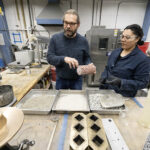The University of Wisconsin-Milwaukee is among 10 universities nationwide funded by the U.S. Department of Energy to launch a Building Training and Assessment Center. These centers will teach technical college students to identify ways to reduce carbon emissions and conserve energy in industrial facilities and commercial buildings that serve mainly disadvantaged communities.
Led by Ryo Amano, professor and Richard and Joanne Grigg Faculty Fellow in mechanical engineering, UWM’s Building Training and Assessment Center (BTAC) will work with five Wisconsin junior and technical colleges to facilitate the energy assessments: Milwaukee Area Technical College, Madison College, Southwest Wisconsin Technical College, Northeast Wisconsin Technical College and Lac Courte Oreilles Ojibwe University, a tribal college in Hayward.
The BTAC will help communities save money and energy while training students for clean energy careers that don’t require a four-year degree.
Most of UWM’s funding, $900,000, comes from the Bipartisan Infrastructure Law through the DOE. An additional $75,000 was given by Focus on Energy, a consortium of utilities in Wisconsin that educates the public about energy conservation and renewables.
BTAC funding also expands the existing network of DOE-supported Industrial Assessment Centers from 37 to 54. IACs operate at four-year colleges and universities, using students to conduct free evaluations of manufacturers and utilities to help them save money and energy and reduce their carbon footprint.
UWM’s College of Engineering & Applied Science has operated the only DOE Industrial Assessment Center in Wisconsin for the last 28 years. Because the assessments are carried out by UWM students, the IAC trains the next generation of energy-engineering professionals. UWM’s IAC completes about 20 assessments a year.
The new BTAC sites will extend the services to build a clean energy workforce at technical colleges.
“We were selected because the college has a long and successful history as a DOE Industrial Assessment Center, where many talented students become well-qualified to conduct energy assessments at a nearly professional level,” Amano said.
He also will work with a long list of state and regional partners to identify commercial and institutional buildings that could benefit from energy assessments.
“This center will collaborate with energy offices in state government, nonprofit organizations, and energy stakeholders throughout Wisconsin and other neighboring states to work on greenhouse gas reduction,” Amano said.
Other partners include the Wisconsin Office of Sustainability and Clean Energy, American Indian Chamber of Commerce-Wisconsin, Leidos, Wisconsin Association of Energy Engineers and the Midwest Energy Efficiency Alliance.





